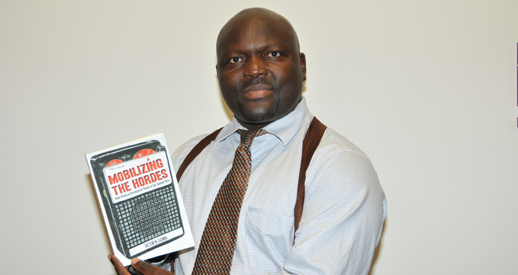
DSU’s Dr. Victor Gomia Authors Book on Development Theatre in Africa
Dr. Victor N. Gomia, an assistant professor of English in the DSU Department of English and Foreign Languages has published a new book titled Mobilizing the Hordes: Radio Drama as Development Theater in Sub-Saharan Africa.
The 296-page volume draws on rich empirical research on radio drama production in Cameroon to offer a strikingly new perspective in development theatre discourse in Africa. Chronicling the history and evolution of development theatre practice in Anglophone Africa and arguing for literary forms that address the basic everyday realities of ordinary people in a medium they understand, the book revisits the crucial question of utilitarian literature in a continent that continues to brandish a begging bowl even as it celebrates fifty years of independence.
As a medium of development communication with unique aesthetic qualities found in and not limited to sound and silence, the author argues, radio drama creates events and condenses reality into dramatic constellations with a high sense of authenticity that invites its audience to participate in the creation process with a strong sense of direction in a story, a plot and a moral.
This people-oriented culture re-animation process, Gomia asserts, is the fertile ground for grassroots empowerment. It is the point of departure for feasible development initiatives that the book explores.
Dr. Gomia holds a Ph.D. in Postcolonial literature and an M.A in Public Administration with concentrations in non-profit and International Development. An author of numerous articles with wide interdisciplinary interest, Dr. Gomia has presented papers at national and international conferences.
Prior to taking a position at Delaware State University in Fall 2011, Dr. Gomia had engaged in research and teaching at Yaounde University 1 (Cameroon), University of Bayreuth (Germany), Kentucky State University and Argosy University On-line (U.S.A).
The book can be purchased from Michigan State University Press, Amazon.com and African Books Collective.

